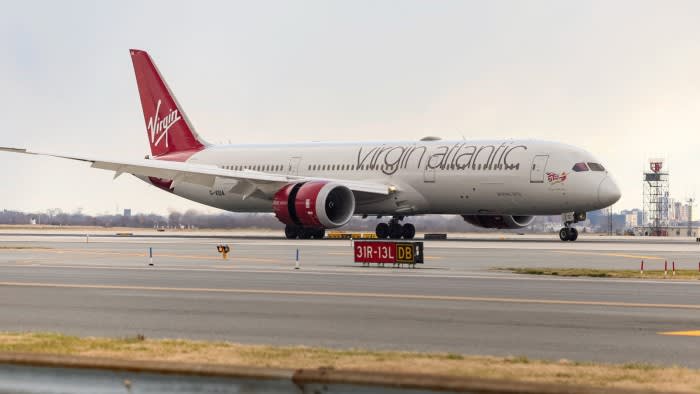Stay informed with free updates
Simply sign up to the Airlines myFT Digest — delivered directly to your inbox.
The UK watchdog has banned a Virgin Atlantic advertisement for making “misleading” claims about the environmental impact of sustainable aviation fuels, as it steps up its crackdown against airlines over “greenwashing”.
The Advertising Standards Authority said the claims in the airline’s ad about the first transatlantic flight to be powered entirely by the aviation fuels made from sustainable sources had breached the regulator’s code.
The aviation industry hailed the November flight, which was backed by the previous UK government and powered by a blend including waste cooking oil and other by-products, as a milestone in its push to decarbonise.
Virgin Atlantic ran a radio ad celebrating its “unique flight mission . . . to become the world’s first commercial airline to fly transatlantic on 100 per cent sustainable aviation fuel”.
But the ASA said the phrase “100 per cent sustainable aviation fuel” gave listeners “a misleading impression of the fuel’s environmental impact”, by implying that the fuel was both zero carbon emissions and had no negative environmental effects.
The ruling marks the first time the regulator has banned an ad because of claims regarding sustainable aviation fuels (SAFs), in a blow to an aviation industry that is relying on the development of the fuels to meet its promises to hit net zero emissions by 2050.
“It’s important that claims for sustainable aviation fuel spell out what the reality is, so consumers aren’t misled into thinking that the flight they are taking is greener than it really is.” said Miles Lockwood, director of complaints and investigations at the ASA.
While SAFs, which are often derived from waste products, crops or fats, emit much less carbon over their life cycle than fossil fuels, they are not emission free.
The UK government says the use of SAFs can reduce emissions by up to 70 per cent compared with the kerosene-type used in most commercial flights.
Virgin estimated that the net CO₂ emissions produced by the flight across the Atlantic was around 64 per cent lower than comparable flights powered by traditional jet fuel.
Virgin Atlantic defended its ad, saying the phrase “100 per cent sustainable aviation fuel” was describing the mix of fuel in the aircraft engines, given that it was fully-powered by SAFs rather than blended with traditional jet fuel.
“While we are disappointed that the ASA has ruled in favour of a small number of complaints, we remain committed to open, accurate and transparent engagement on the challenge of decarbonisation.”
The ASA has issued a string of rulings over the past year on environmental issues as part of a crackdown on “greenwashing”, or making something appear more sustainable than it really is. These have included banning ads by several airlines, as well as some carmakers and oil companies.
The ASA said consumers “were unlikely to be aware of the extent to which fuels described as sustainable aviation fuel still had negative environmental impacts, and in what ways”.
In its ruling, the regulator told Virgin to ensure that future ads that referred to SAFs “included qualifying information which explained the environmental impact of the fuel.”
Climate Capital
Where climate change meets business, markets and politics. Explore the FT’s coverage here.
Are you curious about the FT’s environmental sustainability commitments? Find out more about our science-based targets here


